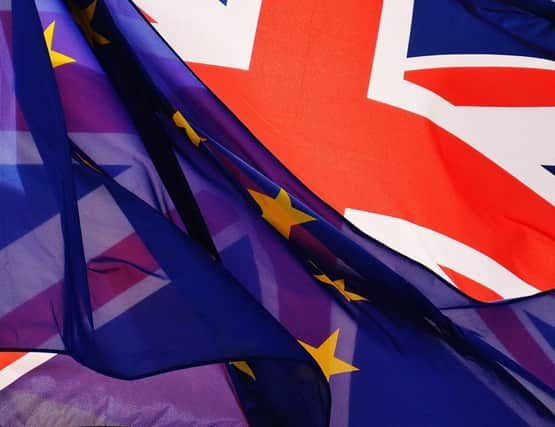EU needs UK more than we need them, finds report
This article contains affiliate links. We may earn a small commission on items purchased through this article, but that does not affect our editorial judgement.


Some 5.8 million positions in the bloc are linked to trade with the UK, compared with 3.6 million jobs nationally tied to the European union, according to analysis by Civitas.
The think-tank said the findings show the EU has far more to lose than Britain if it imposes trade barriers between the UK and the single market following Brexit.
Advertisement
Hide AdAdvertisement
Hide AdThe report, entitled UK-EU trade and jobs linked to exports, found that all but five of the 27 EU members have more jobs riding on exports to Britain than Britain has on exports to those countries.
The study also found every single member state has a higher proportion of its job market at stake in the forthcoming Brexit negotiations than the UK does with that country.
Civitas research fellow Justin Protts, who conducted the analysis, said: “Each of the remaining EU countries has a higher proportion of their workforce employed in jobs that rely on UK trade than the UK has with that EU country.
“Based on the potential impact on jobs, each EU country should be aware of the significant economic benefit in terms of jobs stemming from trade with the UK.”
Germany, often dubbed Europe’s engine, has an estimated 1.3 million jobs, 3.2% of the country’s positions, linked to exports to the UK.
In Britain there are 800,000 jobs tied to exports to Germany, the equivalent of 2.4% of UK jobs.
Smaller countries are particularly reliant on trade with the UK, with the number of jobs tied to it standing at 9.5% in Ireland, 9% in Malta and 8.8% in Cyprus.
Only five - Denmark, Finland, Ireland, Luxembourg and Malta - have fewer jobs linked to UK trade than vice versa. But as a proportion of their jobs market they are also more dependent on UK trade market than the UK is on them.
Advertisement
Hide AdAdvertisement
Hide AdThe analysis also reveals that UK exports to the EU have been in decline, falling from 50% of all exports in 2005 to 42% in 2015.
And the report warned that if the EU continues to fail to strike up major new trade deals and the UK is successful in negotiating new trading relations elsewhere in the world then this rate of decline could steepen.
Mr Protts said: “The EU does arguably have to negotiate as a bloc. However, each of the 27 remaining national governments should be negotiating in the interests of those that democratically elected them.
“The EU, overall, has a net of 2.2 million more jobs linked to UK trade and the Eurozone is still struggling with a highly unbalanced economy and fragile recovery following the 2008 crisis.
“In addition to that, with the fall in the value of the pound, the UK has an increased competitive advantage which will allow it to do more to help UK business export outside the EU which can help offset exposure to a change in trading terms.
“The EU does not have such a luxury.”
Christopher Mills, the Ukip business spokesman, said the findings had cut through “the panic and rumour of the Brexit trade arguments”.
He said: “It will be the pressure of their citizens on national governments that will force continental politicians to recognise that what is good for Britain and British workers is also good for their own populations.
“A fair deal that allows freedom to trade without unrestricted freedom of movement is the clear best solution, for us, and for them.
Advertisement
Hide AdAdvertisement
Hide Ad“German, and French politicians, both with elections coming up must be made aware that restricting trade with the UK will result in their own workers being laid off.
William Dartmouth MEP, Ukip’s trade spokesman, added: “The facts are now clear - it is wholly in the economic interest of the EU countries, and especially Germany, to come to a sensible arrangement with the UK on Brexit.”
•
DOWNLOAD THE SCOTSMAN APP ON ITUNES OR GOOGLE PLAY
